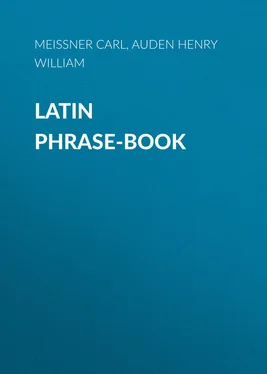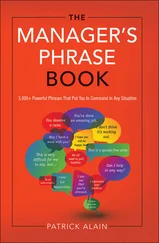Carl Meissner - Latin Phrase-Book
Здесь есть возможность читать онлайн «Carl Meissner - Latin Phrase-Book» — ознакомительный отрывок электронной книги совершенно бесплатно, а после прочтения отрывка купить полную версию. В некоторых случаях можно слушать аудио, скачать через торрент в формате fb2 и присутствует краткое содержание. Жанр: foreign_antique, foreign_prose, на латинском языке. Описание произведения, (предисловие) а так же отзывы посетителей доступны на портале библиотеки ЛибКат.
- Название:Latin Phrase-Book
- Автор:
- Жанр:
- Год:неизвестен
- ISBN:нет данных
- Рейтинг книги:5 / 5. Голосов: 1
-
Избранное:Добавить в избранное
- Отзывы:
-
Ваша оценка:
- 100
- 1
- 2
- 3
- 4
- 5
Latin Phrase-Book: краткое содержание, описание и аннотация
Предлагаем к чтению аннотацию, описание, краткое содержание или предисловие (зависит от того, что написал сам автор книги «Latin Phrase-Book»). Если вы не нашли необходимую информацию о книге — напишите в комментариях, мы постараемся отыскать её.
Latin Phrase-Book — читать онлайн ознакомительный отрывок
Ниже представлен текст книги, разбитый по страницам. Система сохранения места последней прочитанной страницы, позволяет с удобством читать онлайн бесплатно книгу «Latin Phrase-Book», без необходимости каждый раз заново искать на чём Вы остановились. Поставьте закладку, и сможете в любой момент перейти на страницу, на которой закончили чтение.
Интервал:
Закладка:
lacrimula (Planc. 31. 76) – crocodiles' tears.
lacrimae simulatae – crocodiles' tears.
6. Health – Sickness
bona (firma, prospera) valetudine 50 50 valetudo is a neutral term = state of health. sanitas = soundness of mind, reason – e.g. ad sanitatem reverti , to recover one's reason.
esse or uti ( vid. sect. VI. 8., note uti… ) – to enjoy good health.
valetudini consulere, operam dare – to take care of one's health.
firma corporis constitutio or affectio – a good constitution.
infirma, aegra valetudine esse or uti – to be ill, weakly.
in morbum incidit – he fell ill.
aegrotare coepit – he fell ill.
morbo tentari or corripi – to be attacked by disease.
morbo afflīgi – to be laid on a bed of sickness.
lecto teneri – to be confined to one's bed.
vehementer, graviter aeogratare, iacēre – to be seriously ill.
gravi morbo affectum esse, conflictari, vexari – to be seriously ill.
leviter aegrotare, minus valere – to be indisposed.
aestu et febri iactari – to have a severe attack of fever.
omnibus membris captum esse 51 51 Note auribus, oculis, captum esse , to be deaf, blind; mente captum esse , to be mad.
– to be affected by disease in every limb; to be paralysed.
ex pedibus laborare, pedibus aegrum esse – to have the gout.
pestilentia (not pestis ) in urbem (populum) invadit – the plague breaks out in the city.
animus relinquit aliquem – a man loses his senses, becomes unconscious.
morbus ingravescit 52 52 The comparative and superlative of aeger and aegrotus are not used in this connection, they are replaced by such phrases as vehementer, graviter aegrotare, morbus ingravescit , etc.
– the disease gets worse.
morbo absūmi (Sall. Iug. 5. 6) – to be carried off by a disease.
assidēre aegroto (Liv. 25. 26) – to watch by a sick man's bedside.
aegrotum curare – to treat as a patient (used of a doctor).
curationes – method of treatment.
aegrotum sanare (not curare ) – to cure a patient.
ex morbo convalescere (not reconvalescere ) – to recover from a disease.
e gravi morbo recreari or se colligere – to recruit oneself after a severe illness.
melius ei factum est – he feels better.
valetudinem (morbum) excusare 53 53 But se excusare alicui or apud aliquem ( de or in aliqua re ) = to excuse oneself to some one about a thing.
(Liv. 6. 22. 7) – to excuse oneself on the score of health.
valetudinis excusatione uti – to excuse oneself on the score of health.
7. Sleep – Dreams
cubitum ire – to go to bed.
somno or quieti se tradere – to lay oneself down to sleep somnum capere non posse – to be unable to sleep.
curae somnum mihi adimunt, dormire me non sinunt – I cannot sleep for anxiety.
somnum oculis meis non vidi (Fam. 7. 30) – I haven't had a wink of sleep.
arte, graviter dormire (ex lassitudine) – to sleep soundly (from fatigue).
artus somnus aliquem complectitur (Rep. 6. 10) – to fall fast asleep.
somno captum, oppressum esse – to be overcome by sleep.
sopītum esse – to be sound asleep.
in lucem dormire – to sleep on into the morning.
somno solvi – to awake.
(e) somno excitare, dormientem excitare – to rouse, wake some one.
e lecto or e cubīli surgere – to rise from one's bed, get up.
per somnum, in somnis – in a dream.
per quietem, in quiete – in a dream.
in somnis videre aliquid or speciem – to see something in a dream.
in somnis visus (mihi) sum videre – I dreamed I saw…
species mihi dormienti oblata est – I saw a vision in my dreams.
somnium verum evādit (Div. 2. 53. 108) – my dream is coming true.
somnium interpretari – to explain a dream.
somniorum interpres, coniector – an interpreter of dreams.
somniare de aliquo – to dream of a person.
8. Death
(de) vita decedere or merely decedere – to depart this life.
(ex) vita excedere, ex vita abire – to depart this life.
de vita exire, de (ex) vita migrare – to depart this life.
mortem (diem supremum) obire – to depart this life.
supremo vitae die – on one's last day.
animam edere or efflare – to give up the ghost.
extremum vitae spiritum edere – to give up the ghost.
animam agere – to be at one's last gasp.
mors immatura or praematura – an untimely death.
mature decedere – to die young.
subita morte exstingui – to be cut off by sudden death.
necessaria (opp. voluntaria ) morte mori – to die a natural death.
morbo perire, absūmi, consūmi – to die a natural death.
debitum naturae reddere 54 54 sua morte defungi or mori is late Latin, cf. Inscr. Orell. 3453, debitum naturae persolvit .
(Nep. Reg. 1) – to die a natural death.
mortem sibi consciscere 55 55 se interficere, se occidere, se necare are rare. During the classic period, when suicide was not common, ipse is often added – e.g. Crassum se ipsum interemisse (Cic. Scaur. 2. 16), Lucretia se ipsa interemit (Fin. 2. 20. 66); but later, when suicide had become frequent, se interemit; nonnulli semet interemerunt (Suet. Iul. 89), etc., occur commonly.
– to commit suicide.
se vita privare – to take one's own life.
manus, vim sibi afferre – to lay hands on oneself.
vitae finem facere – to put an end to one's life.
talem vitae exitum (not finem ) habuit (Nep. Eum. 13) – such was the end of… (used of a violent death).
mortem oppetere – to meet death (by violence).
mortem occumbere pro patria – to die for one's country.
sanguinem suum pro patria effundere or profundere – to shed one's blood for one's fatherland.
vitam profundere pro patria – to sacrifice oneself for one's country.
se morti offerre pro salute patriae – to sacrifice oneself for one's country.
dare venenum in pane – to give a person poison in bread.
venenum sumere, bibere – to take poison.
veneno sibi mortem consciscere – to poison oneself.
poculum mortis (mortiferum) exhaurire (Cluent. 11. 31) – to drain the cup of poison.
potestas vitae necisque – power over life and death.
plagam extremam or mortiferam infligere – to inflict a death-blow.
e or de medio tollere – to remove a person.
perii! actum est de me! (Ter. Ad. 3. 2. 26) – I'm undone! it's all up with me!
9. Burial
funere efferri or simply efferri ( publice; publico, suo sumptu ) – to be interred (at the expense of the state, at one's own cost).
Читать дальшеИнтервал:
Закладка:
Похожие книги на «Latin Phrase-Book»
Представляем Вашему вниманию похожие книги на «Latin Phrase-Book» списком для выбора. Мы отобрали схожую по названию и смыслу литературу в надежде предоставить читателям больше вариантов отыскать новые, интересные, ещё непрочитанные произведения.
Обсуждение, отзывы о книге «Latin Phrase-Book» и просто собственные мнения читателей. Оставьте ваши комментарии, напишите, что Вы думаете о произведении, его смысле или главных героях. Укажите что конкретно понравилось, а что нет, и почему Вы так считаете.

![Рис Хьюз - Madonna Park[e-book - рассказы]](/books/94285/ris-hyuz-madonna-park-e-book-rasskazy-thumb.webp)










